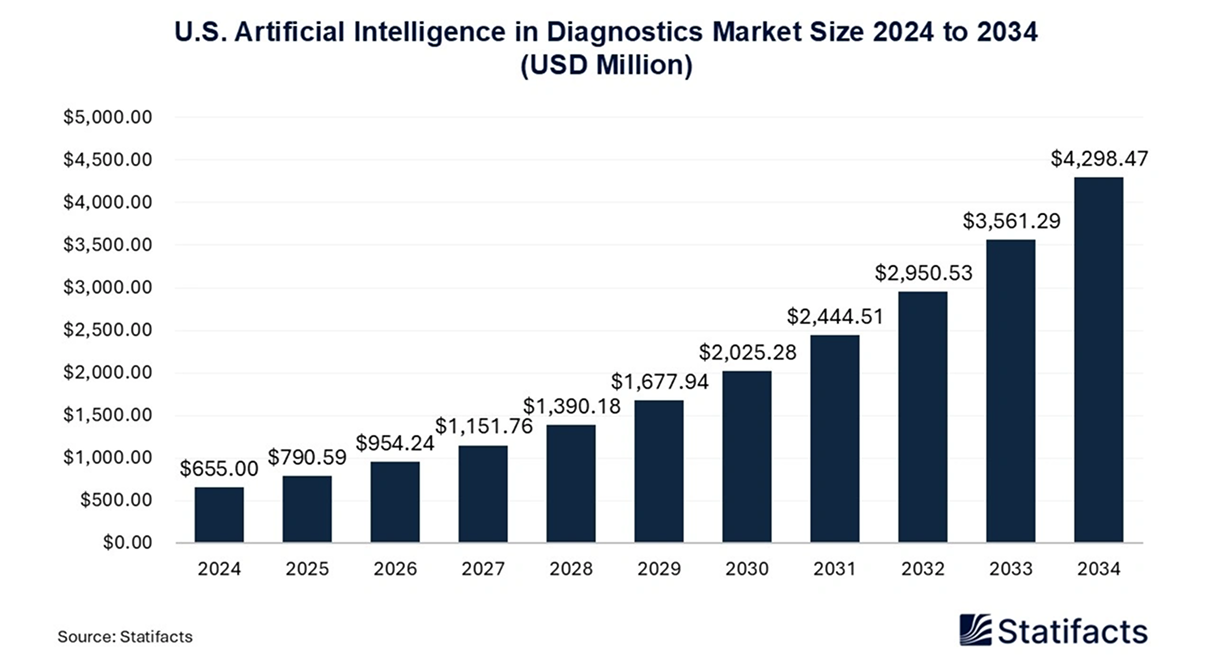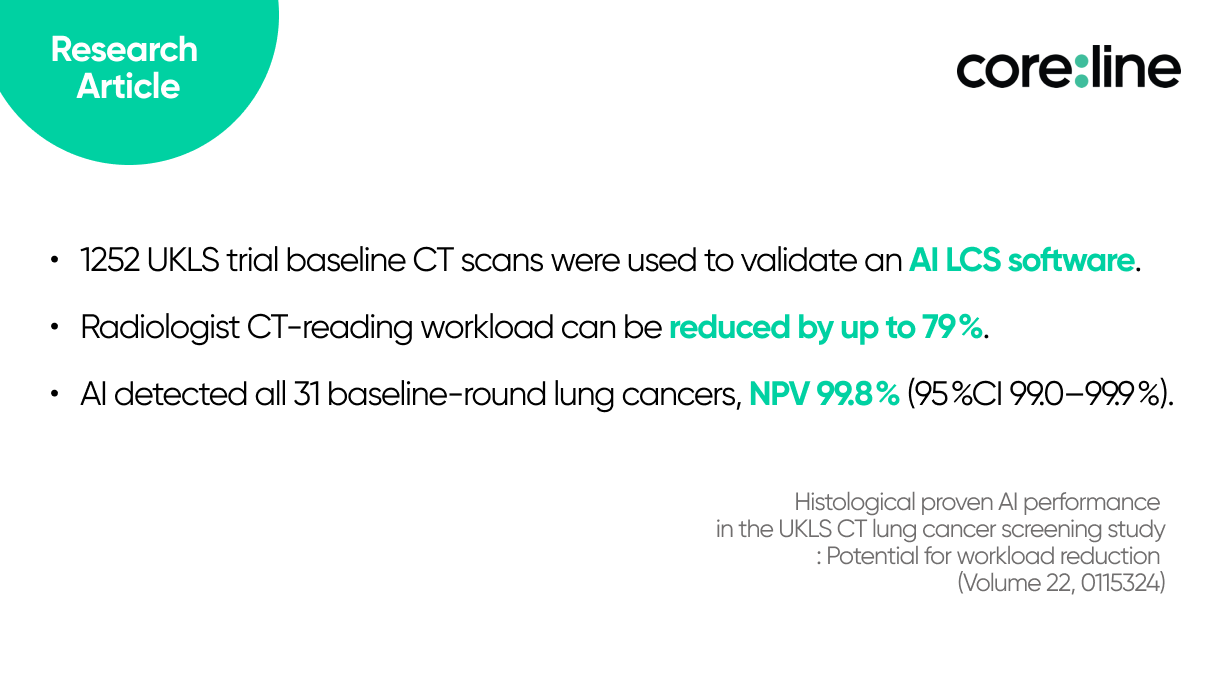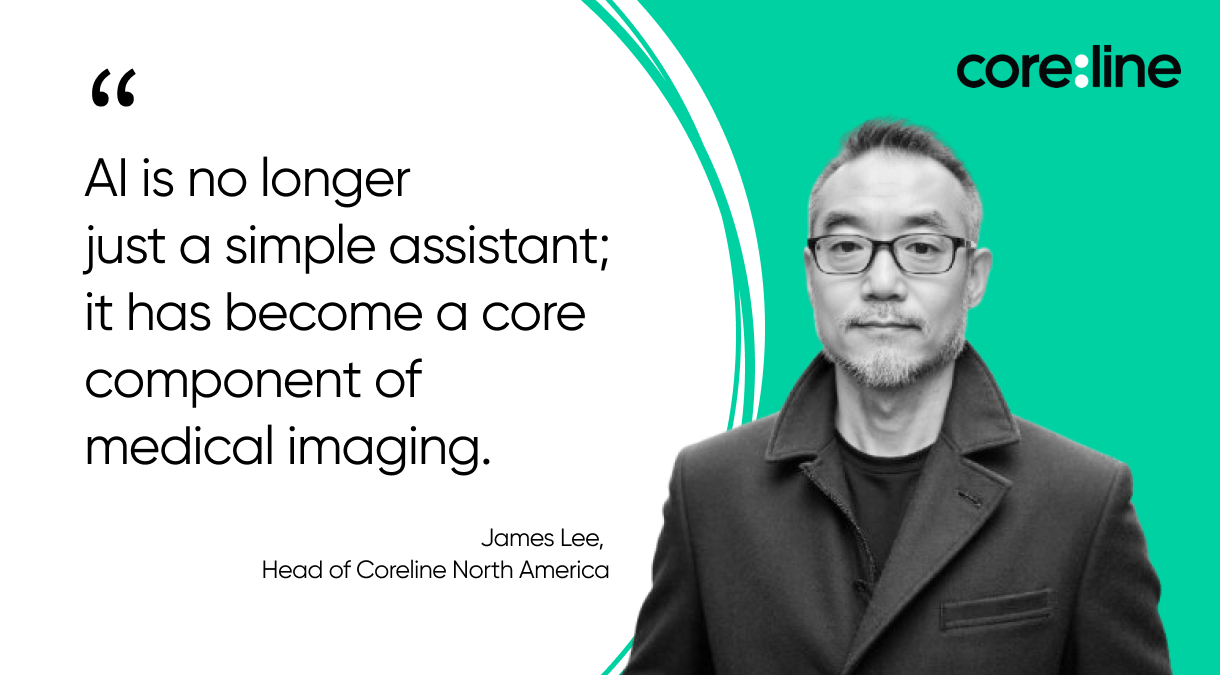Even a skilled drivers get lost without a navigation system in an unfamiliar city, and it takes trial and error to reach their destination. The healthcare industry also relies on a variety of aids and technologies to ensure accurate readings and diagnoses. Before the advent of AI, the medical imaging market mainly relied on the skilled experience and knowledge of radiologists to read medical images. The process was somewhat analog, and it took a lot of time and effort for medical staff to process complex and large amounts of medical image data.
With the rapid advancement of medical technology, AI-powered automated image reading is now at the center of medical innovation, especially as the demand for medical imaging tests explodes due to an aging population and the rise of chronic diseases. This trend is accelerating the adoption of AI in lung cancer screening, transforming the healthcare ecosystem in the United States. Let's take a look at the current healthcare AI market trends and what the future holds.
The state of the US healthcare AI market in 2025: Market Growth & Key Trends
According to a report by global market research firm Statifacts (2025.02), the U.S. AI medical diagnostics market is expected to be worth $790.059 million in 2025, and is expected to grow to $4.29 billion by 2034.

AI-powered software is the fastest growing segment. As of 2024, diagnostic software generated the highest revenue and is expected to continue to lead the market. AI diagnostic technologies related to neurological diseases are being actively developed, and the application of AI in radiology is also spreading rapidly. In fact, the Mayo Clinic, a non-profit academic medical center in the United States, is actively applying AI technology to diagnose cardiovascular diseases and other conditions.
The focus on AI medical diagnostics by major U.S. hospitals and research organizations is driven by the importance of Incidental Findings and Opportunistic Screening.
The Importance of AI-Powered Incidental Findings & Opportunistic Screening in Early Disease Detection
Incidental findings are when an unexpected condition or abnormality is detected during an imaging exam. AI-powered automated image reading increases the likelihood of these incidental findings, increasing the chances of early diagnosis and treatment.
Opportunistic screening means selectively offering screening to people at high risk for a particular condition. AI-powered automated image reading increases the efficiency of opportunistic screening, contributing to disease prevention and early treatment. It plays an essential role in increasing the efficiency of medical staff and improving the accuracy of image readings.
As such, AI technology is enabling comprehensive interpretation of radiology data and expanding opportunities for early diagnosis through incidental findings and opportunistic screening. The U.S. Preventive Services Task Force (USPSTF) and the American College of Radiology (ACR) are in discussions to evaluate the efficiency of AI-based lung cancer screening and the clinical impact of incidental findings, and to clarify the role of AI reading assistants.
Strengthening the Credibility & Validation of the U.S. Healthcare AI Market
Despite this, many people, including healthcare providers, may question the accuracy of AI-powered diagnostics. Addressing these concerns and accelerating the advancement of AI-powered diagnostics will require efforts from both the business and healthcare industries.
The clinical impact of AI-powered healthcare technology goes beyond mere technical accuracy to mean the difference it makes to patients in the real world. Assessing this requires a multifaceted approach. In other words, no matter how good the technology is, it's essential to clearly validate its impact on patients in real-world clinical settings.
AI-Based Diagnostic Software: Proven & Validated in Clinical Trials
Recent results show that CorelineSoft's AVIEW LCS Plus, a simultaneous diagnostic product for chest diseases, is an AI solution suitable for first-readers, actively helping to improve the efficiency of the diagnostic process.
An Institute for Diagnostic Accuracy (IDNA) study found that AVIEW LCS Plus significantly reduced radiologists' workload while improving diagnostic accuracy. On December 28, 2024, a research paper on first-reading performance was published in the European Journal of Cancer, demonstrating the significant promise of using AI as a first-reading tool.

The study found that AVIEW LCS was significantly less likely to misidentify nodules larger than 100 mm3 than human radiologists. Rather than simply assisting in reading, AI is improving the accuracy of the reading by filling in the gaps that radiologists might miss. This is an important achievement that strengthens the case for AI technology as a first-reader in the lung cancer screening process.

The Future of Healthcare AI in the U.S.: Trends & Innovations in 2025 & Beyond
The trends that currently define the U.S. healthcare AI industry are changing rapidly. As James Lee, President of CorelineSoft North America, says, “AI is no longer just an assistant. It's at the heart of medical imaging, and we're constantly evolving to advance AI and support the future of precision medicine.”
If AI is to become a key tool to help physicians make decisions throughout the diagnostic and treatment process, not just in reading, it needs to be more than just technologically superior. Healthcare AI is more than a technology tool, it plays a key role in increasing operational efficiency and improving the patient experience for healthcare organizations. This means that healthcare AI software providers and consumers need to build partnerships that grow with the ever-changing healthcare landscape, not just one-off customer relationships.



 List
List




